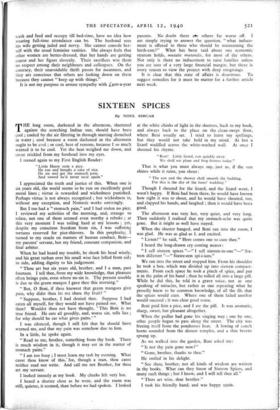SIXTEEN SPICES
By NOEL SIRCAR
THE long room, darkened in the afternoon, shuttered 1 against the scorching Indian sun, should have been cool ; cooled by the air filtering in through matting drenched in water ; cool because a room darkened in the afternoon ought to be cool ; or cool, best of reasons, because I so much wanted it to be cool. Yet the heat weighed me down, and sweat trickled from my forehead into my eyes.
I turned again to my First English Reader:
"Little Harry stole a pice.
He ran and bought a cake of rice. He ate and got the stomach pain, And vowed he'd never steal again."
I appreciated the truth and justice of this. When one is six years old, the world seems to be run on excellently good moral lines ; virtue is rewarded and wickedness punished. Perhaps virtue is not always recognised ; but wickedness is, without any exception, and Nemesis works untiringly.
But I too had a "stomach pain," and I had stolen no pice. I reviewed my activities of the morning, and, strange to relate, not one of them seemed even worthy a rebuke ; at this very moment I was toiling hard at my lessons ; yet, despite my conscious freedom from sin, I was suffering tortures reserved for pice-thievers. In this perplexity, I turned to my oracle on matters of human conduct, Beth— my parents' servant, but my friend, constant companion, and final arbiter.
When he had heard my trouble, he shook his head wisely, and his great turban over his small wise face lolled from side. to side, adding dignity to his judgement.
"Thou art but six years old, brother, and I a man, past fourteen. I tell thee, from my wide knowledge, that pleasure often brings pain, even where no sin is. Thy present trouble is due to the green mangos I gave thee this morning."
"But, 0 Beth, if thou knewest that green mangoes give pain, why didst thou let me share thy fruit?"
"Suppose, brother, I had denied thee. Suppose I had eaten all myself, for they would not have pained me. What then? Wouldst thou not have thought, 'This Beni is no true friend. He eats all greedily, and, worse sin, tells lies ; for why should he eat what gives pains.'" I was silenced, though I still felt that he should have warned me, and that my pain was somehow due to him.
In a little, he spoke again.
"Read to me, brother, something from thy book. There is much wisdom in it, though it may err in the matter of stomach pains."
"I am too busy ; I must learn my task by evening. What canst thou know of this, for, though a man, thou canst neither read nor write. And call me not Brother, for thou art my servant.
I looked intently at my book. My cheeks felt very hot.
I heard a shutter close as he went, and the room was still, quieter, it seemed, than before we had spoken. I looked at the white chinks of light in the shutters, back to my book, and always back to the place on the clean-swept floor, where Beth usually sat. I tried to learn my spellings, but they would not take hold in my mind. At last a lizard waddled across the white-washed wall. At once I shouted his rhyme.
"Run! Little lizard, run quickly away.
We shall eat plum and frog fritters today."
That is what you must always say, just as, if the sun shines while it rains, you shout:
"The sun and the shower shall smooth the bedding, For this is the day of the foxes' wedding."
Though I shouted for the lizard, and the lizard went, I wasn't happy. If Beth had been there, he would have known how right it was to shout, and he would have shouted, too, and clapped his hands, and laughed ; then it would have been good.
The afternoon was very hot, very quiet, and very long. Then suddenly I realised that my stomach-ache was quite gone. But it might as well have stayed.
When the shutter banged, and Beni ran into the room, I was glad. He was as glad as I, and excited.
"Listen!" he said, "Here comes one to cure thee."
I heard the long-drawn cry coming nearer: "I sell sixteen spices "—" I sell sixteen-in-one "—" Six- teen different "—" Sixtee-een spi-i-ices."
We ran into the street and stopped him. From his shoulder he took a box, which was divided up into sixteen compart- ments. From each space he took a pinch of spice, and put it in the palm of his hand ; then he rolled all into a large pill. While he did this, he told in a grave voice, not as one speaking of miracles, but rather as one repeating what he proudly knew to be common knowledge, of all the ilLs that the spices would cure. Where one of them failed another would succeed ; it was clear good sense.
Beni paid him a pice, and I ate the pill. It was aromatic, sharp, sweet, but pleasant altogether.
When the pedlar had gone his singing way ; one by one, other people began to pass along the street. The city was freeing itself from the ponderous heat. A lowing of conch horns sounded from the distant temples, and a thin breeze sprang up.
As we walked into the garden, Beni asked me: "Is not thy pain gone now?"
"Gone, brother, thanks to thee."
He smiled in his delight.
"See thou, brother, not all kinds of wisdom are written in thy books. What can they know of Sixteen Spices, and many such things ; but I know, and I will tell thee all."
"Thou art wise, dear brother."
I took his friendly hand, and was happy again.


































 Previous page
Previous page